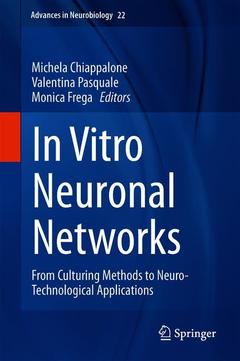In Vitro Neuronal Networks, 1st ed. 2019 From Culturing Methods to Neuro-Technological Applications Advances in Neurobiology Series, Vol. 22
Coordonnateurs : Chiappalone Michela, Pasquale Valentina, Frega Monica

Michela Chiappalone research interests are in the field of Neuroengineering. She obtained a PhD in Electronic Engineering and Computer Science from University of Genova (Italy) in 2003. In 2002 she has been visiting scholar at the Department of Physiology, Northwestern University (Chicago, IL, USA). After a Post Doc at the University of Genova, in 2007 she joined the Neuroscience and Brain Technologies Dept at the Istituto Italiano di Tecnologia (IIT) as a Post Doc. In 2013 she got a group leader position (‘Researcher’) in the same Institution. In 2015 she has been visiting Professor at KUMED (Kansas City, KS, USA), hosted by Prof. R.J. Nudo.
From 2012 to 2015 M. Chiappalone has been Coordinator of the FET Open European Project BrainBow, judged excellent. In 2017, M. Chiappalone joined the Rehab Technologies IIT-INAIL Joint Lab of IIT to lead a group aimed at interfacing robotic devices with the nervous system for applications in neuroprosthetics, neuromodulation and neurorehabilitation. In 2018 she got the national scientific habilitation as Full Professor of Bioengineering.
She authored 60 papers published in International Journals, 50 peer-reviewed contributions to International Conferences, 8 Book Chapters and she gave more than 60 scientific talks at International/National Conferences and Research Institutions.Valentina Pasquale got the PhD in "Humanoid Technologies" from the University of Genova and Istituto Italiano di Tecnologia in 2010. During PhD, she focused on developing analysis tools to characterize the spontaneous and evoked activity of cortical and hippocampal networks cultured on micro-electrode arrays, seen as a reduced biological model for the generation of coordinated neuronal activity. During post-doc she was involved in neuro-robotics and neuro-prosthetics studies, aimed at understanding how to interface artificial devices (as a small robot or a simulated neural network) and neuronal systems, with the final
Date de parution : 05-2019
Ouvrage de 387 p.
15.5x23.5 cm



